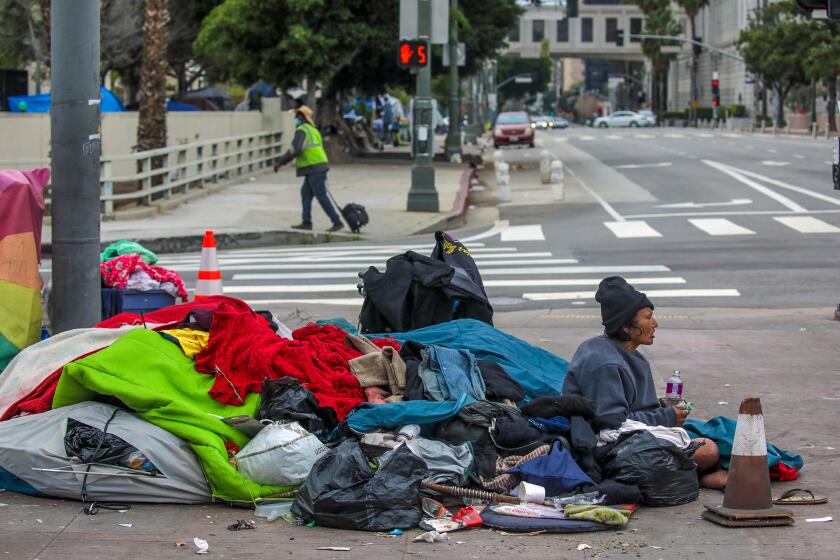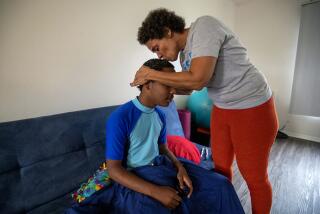A failing mental health system leaves this mother pleading: Keep him in jail
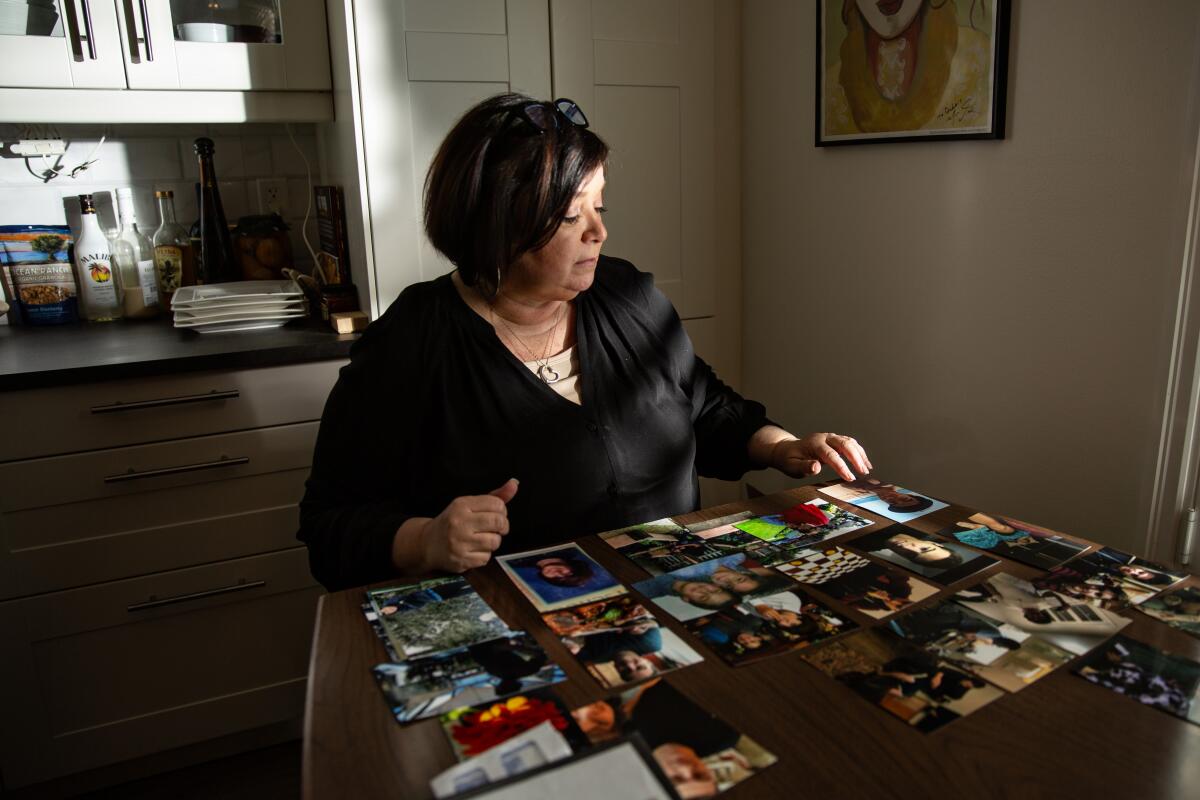
Deborah Smith begins her days online, searching for her son’s name on the Los Angeles County sheriff’s inmate locator, a ritual she shares with many moms she’s bonded with over the years.
“This is something that mental health mothers get used to when you don’t know where your kid is,” she said. “You can call hospitals, but they won’t tell you. The only thing you have left is, ‘Did he get arrested?’ ”
His name came up after his Oct. 7 arrest in Santa Monica. He was standing in traffic waving a knife and wearing a Ghostface mask from the movie “Scream.”
It was a moment of hope, a chance to appear in court and plead with a judge to petition for conservatorship.
That’s not what happened. Just 10 hours after his arrest, Nicholas was released. It was late on a Friday night, and she knew he would not make his court date the following Tuesday.
A month later, the bench warrant caught up with Nicholas. He was arrested on a Saturday. She called the Santa Monica Police Department and begged the watch commander to hold him for his court appearance Monday.
Two days later, she was driving from Monrovia to the West Los Angeles Courthouse when a detective called. Nicholas had been released at 11:51 Sunday night.
All she could do was wait for the next surprise. She knew it would come. She just didn’t know what it would be or when. And with fentanyl now tainting the illegal drug supply across the county, every day she feared a call from the coroner.
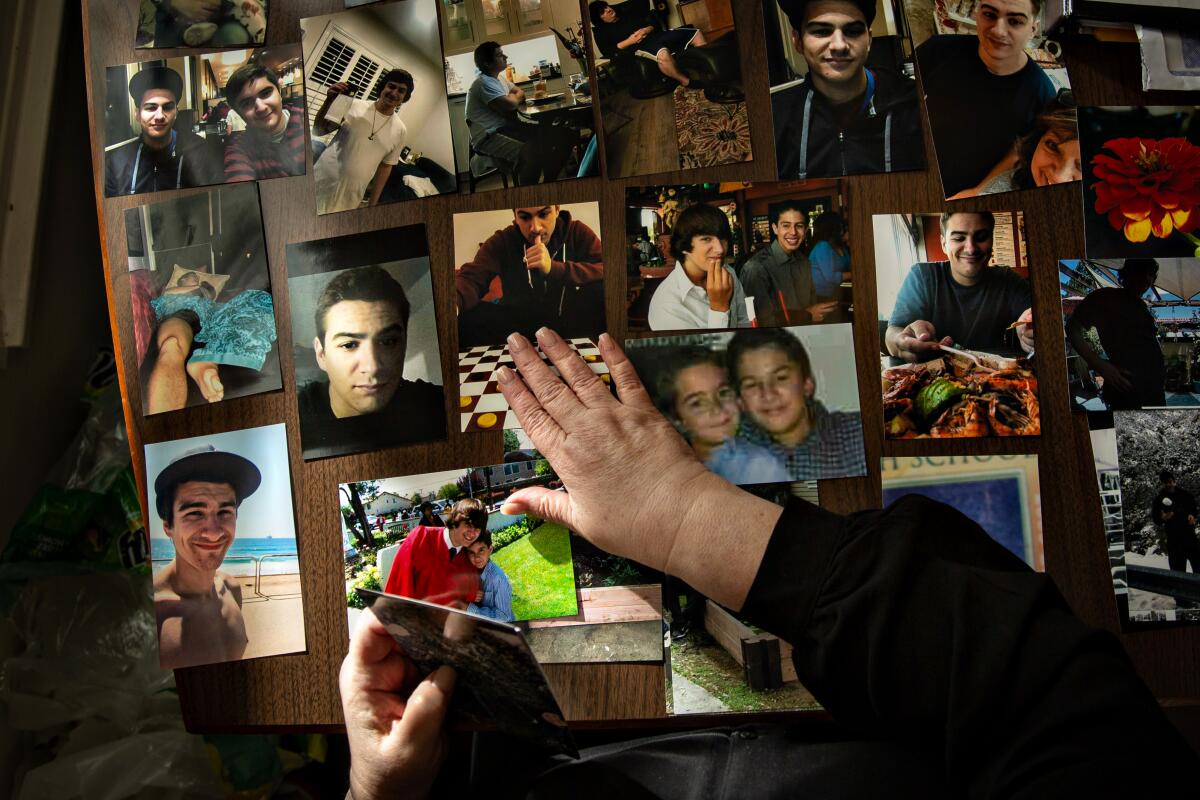
This is the slow, grinding reality that Deborah has almost grown inured to over a decade in which she saw her son change from a handsome, popular and attentive teenager into an emaciated, delusional 29-year-old street dweller with increasingly violent impulses.
She has learned to clinically dissect the failings of a mental health system whose employees often tried as hard as she did, and other times tried hardly at all, but always came up with the same results, at best a temporary fix to relieve the mounting pressure of an episode, at worst a shrug of resignation leaving the next move to her.
“Put him up in a motel. Let’s see what happens,” she once told herself years earlier when she picked him up on Mission Road lugging a bag full of Bibles after his release from Twin Towers jail.
That didn’t turn out better than any of the other fixes.
She names the lifelines she’s grasped at with the detachment of a shopping list until her neck turns red and tears begin to flow. Restraining order, 911, 5150, PET, AOT, MET, HOME, LPS, IMD.
“My son is getting dangerous,” she said. “He’s getting dark. He’s getting really scary.”
The life of a 31-year-old living with schizophrenia illustrates the toll of illness and the challenge of getting severely mentally ill people off the streets.
A small woman of 60 who now lives alone in Duarte and spends her days — the normal ones anyway — working for a medical supply business, Deborah is looking for an answer, not a platform to vent frustration and rage.
She is deeply grateful for the care Nicholas has received from county mental health workers, one of whom has stood by her for eight years.
What they have yet to provide — the only option she believes holds any hope for Nicholas — is long-term involuntary commitment. As Nicholas’ episodes grew more frequent and severe, she pleaded with one psychiatric hospital after another to petition for a conservatorship, the civil process that empowers a public guardian to order a person into locked treatment.
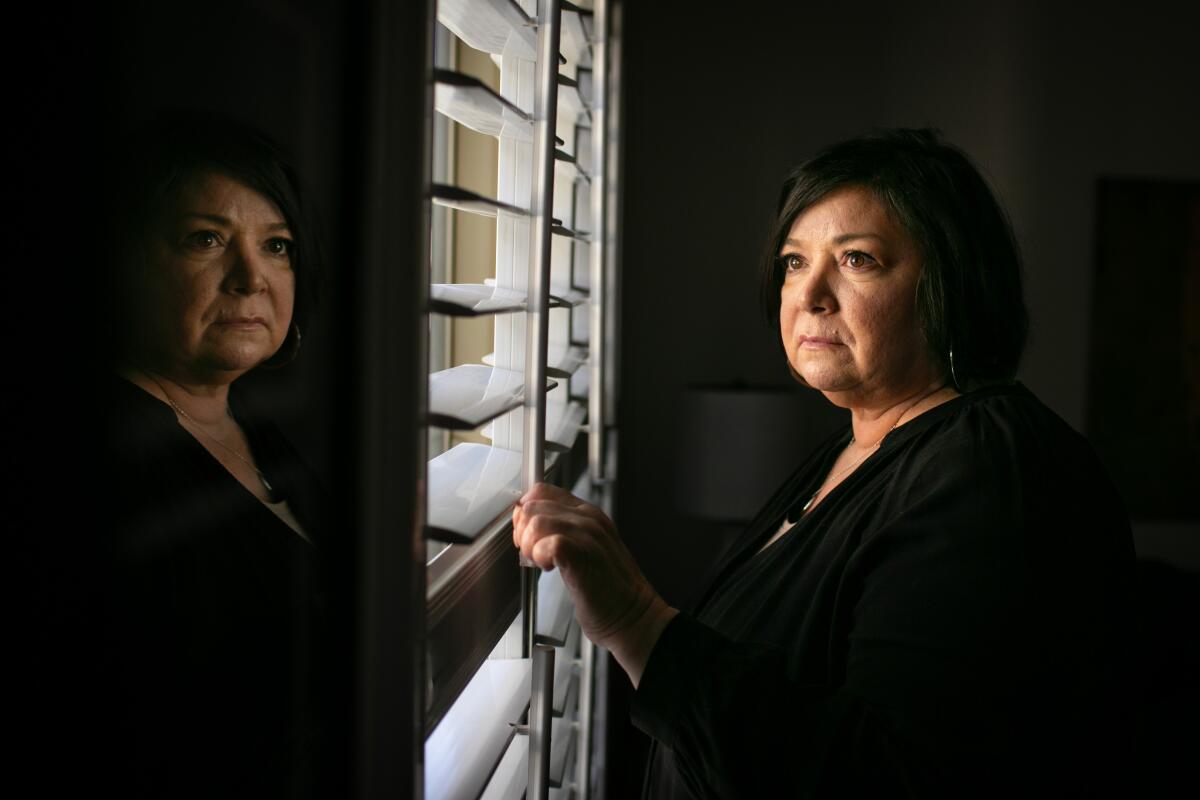
“I want to conserve,” she’d tell them. “He’s not able to manage his own life. He’s erratic. We can’t control him. He doesn’t have a place to stay. He doesn’t eat.”
“Well, he’s not a danger to self and others,” is the reply, she said, citing the fundamental definition of gravely disabled, the legal basis for extending a temporary detention.
Deborah believes the hospitals that have discharged Nicholas after a few days of treatment knew well that he was gravely disabled. The real reason they declined to seek a conservatorship was their resistance to committing expensive, acute-care hospital beds for months while the petition works its way through the court. Less costly long-term facilities, called subacute care or institutions for the mentally disabled (IMDs), are chronically backed up.
The county Department of Mental Health does not track how many temporary commitments end in conservatorships. But a 2020 report by the state auditor, using data collected by the state Department of Justice for background checks, found evidence of a revolving door. In Los Angeles County, nearly 10,000 people had been placed on at least 10 holds in their lifetime. Only about 1 in 16 temporary holds led to a conservatorship.
Like so many parents of children who fall into psychosis in early adulthood, Deborah is caught between the loving impulse to care for her adult son and the legal fact that she no longer has parental rights.
She can let him live with her or kick him out, and has done both many times. She can call the police when he’s threatening or breaks things in the apartment. She can cajole patrol officers to call in their mental evaluation teams. She can plead with mental health workers to take him on 5150s, the 72-hour involuntary detentions. She has done it all.
But, under current law, she has no right to make medical decisions or even get information about his treatment.
In principle, that will change in the fall of 2024, when Community Assistance, Recovery and Empowerment (CARE) Court goes into effect in Los Angeles County. Among its other provisions, the new law provides legal standing for interested parties such as parents to initiate conservatorship proceedings authorized under the state’s decades-old Lanterman-Petris-Short Act.
“I’ll be the first in line for CARE Court,” Deborah said. “But I don’t think it will help. It doesn’t have the resources.”
She’s learned from repeated attempts to get the care she believes Nicholas needs, both with and without his consent, that there is nowhere near enough of it.
“There is no infrastructure built to take care of them,” she said. “There are no beds. It’s a soup kitchen with no food.”
::
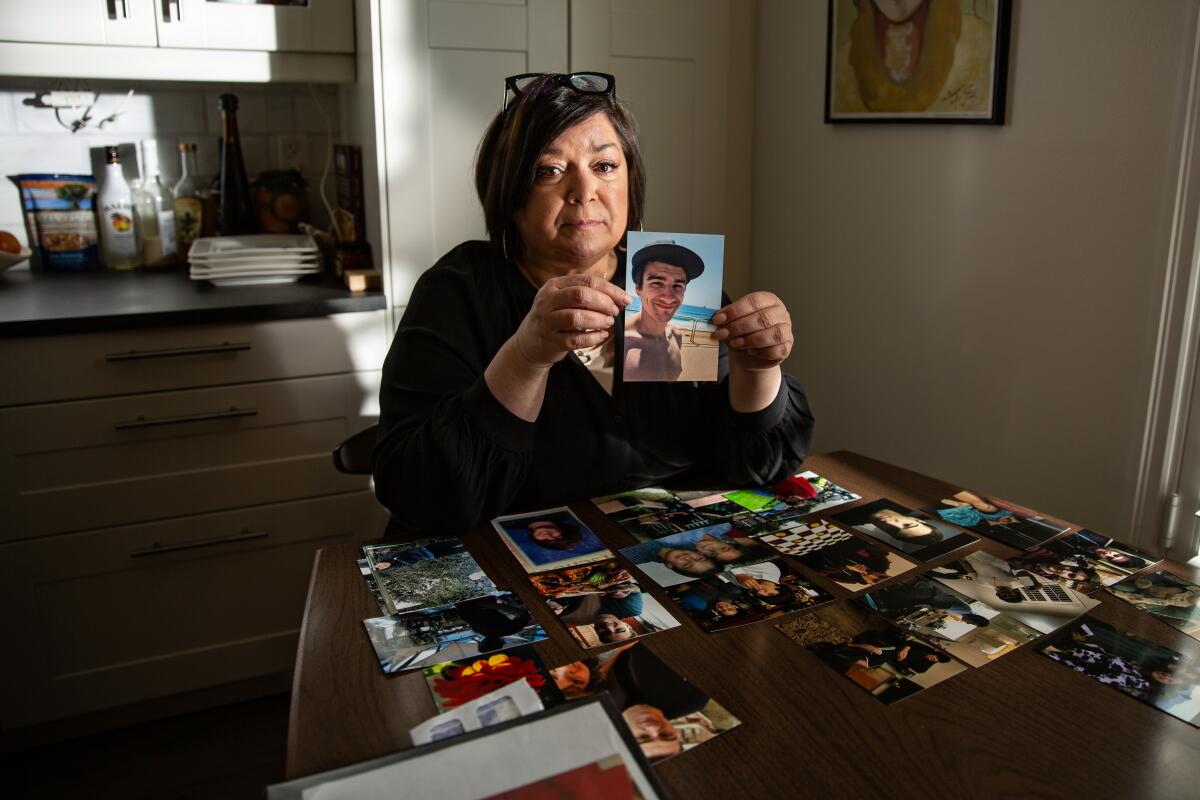
Nicholas’ transformation, now spanning more than a decade, began so subtly that Deborah misread the signs.
When, after high school graduation, he told her he had no interest in college or employment and instead planned to become a marijuana grower, she decided he needed tough love.
“What am I teaching my son if I allow him to continue this?” she thought.
She gave him a choice: Enroll in school, get a job or leave.
“Tough love turned into near homelessness,” she said.
After a brief stay with his father in nearby Temple City, he moved in with some friends.
“His behavior became more erratic,” she said. “I heard from him less and less.”
They were drawn together briefly by her father’s terminal illness. His death seemed to mark a turning point. Nicholas moved back with his mom and younger brother, but their relationship became tumultuous — verbal fights and physical intimidation punctuated by long disappearances. Deborah was beginning to see his behavior as mental illness.
The first of seven psychiatric holds came four months later when Nicholas was 21. Deborah turned him away when he showed up at her door with rocks in hand. She contacted the county Department of Mental Health. With the help of a private investigator, a psychiatric emergency team (PET) found him in Pasadena several days later, and the team’s clinician judged him a danger to himself and others. A clinician at Northridge Hospital gave her an informal diagnosis, bipolar disorder. She thought his drug use could be a factor.
After 16 days at Northridge, Nicholas was released to a sober living home Deborah found for him. Only a few days later, he walked out and returned to live with his mother and brother, beginning a cycle of tension, blowups, homelessness, stints with his father, then friends and, finally, reunification with his mother, starting the cycle again.
Interventions, when Nicholas was judged a danger either to himself or others or both, came at a quickening pace. He was placed on involuntary holds at psychiatric hospitals in 2015, 2019, 2020, twice in 2021, then March of this year, according to records kept by Deborah.
If anyone should have been able to escape homelessness, it’s John Maurer, whose siblings are prominent in L.A.’s homelessness and mental health systems.
Between 2016 and 2019, Nicholas was arrested twice on suspicion of misdemeanor assault with a deadly weapon. After the first arrest, over an altercation with other street people, he spent 22 days in jail. A 45-minute standoff with sheriff’s deputies — after he broke his father’s cellphone with a dumbbell bar — sent him to Twin Towers jail, where he stayed six months, much of it in solitary confinement because of his outbursts.
During one of Deborah’s visits, he told her he was playing chess with Jesus, finally convincing her that what she once rationalized as drug-induced bad behavior was indeed serious mental illness.
Several times he agreed to a mental health diversion but, when transferred to court, refused to sign the paperwork, she said. Finally, he pleaded guilty in exchange for a one-year sentence with early release in February 2019.
He did not call Deborah, but the mental health director at the jail tipped her off. She found him walking on Mission Road with a plastic bag full of Bibles slung over his shoulder.
“I took him to get something to eat,” she said. “I can’t bring him back home.”
She put him in a motel. Within three days he had taken in a roommate, a homeless woman who had been at his side during several of his previous crises, then got into a confrontation with her other companions.
“He tells me, ‘I’m going to get a gun and I’m going to shoot them,’ ” she recalled. “There I am with mental health again. It took three days and he was back on a mental health hold.”
His stay at BHC Alhambra Hospital was short.
“They let him out after five days with no plan again, on the streets,” she said. In a statement, BHC said its “protocol includes providing every discharging patient with a complete aftercare plan signed off by our multi-disciplinary care team.”
By then Deborah had moved to Duarte not intending to tell Nicholas where she lived. She softened when he swore that he was done with his friends.
“I’m like, OK, back in the house.”
Soon, though, at the beginning of a psychotic episode, Nicholas threatened his brother with a butter knife. He was sent to St. Francis Medical Center in Lynwood on a hold that lasted 30 days. Under court order, he was given an injection of long-lasting medication and released.
When Deborah took him for his appointment to have it renewed, he balked.
“I don’t want to do this. I don’t need this,” he said, standing outside in the rain.
In 2020, Nicholas became a client of Assisted Outpatient Treatment (AOT), the county’s program under Laura’s Law, adopted by the Legislature in response to the 2001 killing of Laura Wilcox by a seriously mentally ill man.
It provides personalized care for people who are resistant to psychiatric treatment.
Mental illness is a primary driver of homelessness in Los Angeles. We have the tools to make things better.
For a time, AOT’s psychologists and social workers brought Deborah hope.
“His therapist was really good,” she said. “He’d come to the house. They’d usually sit out on the patio. Nick was engaging. He was engaging. I felt good he was getting treatment. Someone with a trained eye was observing him.”
But Nicholas eventually decided his therapist wanted to kill him and refused to see him.
“Nick had moved on from his delusion of being a Christian to being a Viking — Thor and Freya. His delusions were getting more and more dangerous. He was getting darker. He said he’s going to kill me. I didn’t want him here.”
His AOT team obtained a court order to make the treatment involuntary. The therapist put him on a hold at Aurora Charter Oak Behavioral Health Care in Covina.
By this time, Deborah believed the only hope for Nicholas was conservatorship. She had connected with the National Alliance on Mental Illness and had learned how to document her son’s mental illness.
“You send the symptoms, history and characteristics,” she said. “I am giving you hardcore evidence that my son is getting dangerous. He’s getting dark. He’s getting really scary.”
The hospital therapist refused to discuss the case, she said. Nicholas had learned that he could refuse to sign a release, locking his mother out.
“Charter Oak lets him out after five days,” she said. “They give him $40 cash so they’re not considered indigent — $40 and a Tap card for the bus and a ham sandwich and out.”
Charter Oak Chief Executive John Meier said he could not comment on any case, but said in a statement: “We pride ourselves on the individualized patient care we provide at Charter Oak, which extends to the services we connect individuals to upon discharge.”
Nicholas came back home and began asking Deborah to get him a gun to protect them from someone he expected at their door. She began recording their conversations and sending them to his AOT therapist and social worker.
In one, he asked her in a monotone voice, “Are you going to your coffin tonight, or the next couple of days after the coroner looks at your body [inaudible] with two bullets in the head and a cracked skull? You’re going to run into your bedroom and lock your door and they’re going to kick your door in.”
“What makes you think someone’s coming?” she asked.
“Because I keep having recurring dreams,” he answered.
“OK, I think we finally have something,” the clinician said when she sent the video.
The clinician had him committed to Augustus Hawkins Mental Health Center in South Los Angeles. His psychiatrist there filed a petition for conservatorship.
The judge declined to put him on a temporary conservatorship pending a hearing. Deborah doesn’t know why, but heard that someone put a note in the file that Nicholas was not a danger to himself or others. The psychiatrist did not attend the hearing.
He was released on Jan. 3, 2022, after 47 days.
He slept that night under a bridge in Duarte. The next day he showed up at his mother’s door. He promised to go on medication.
Three days later he barged into her bedroom at 3 a.m., grabbed the medication and flushed it down the toilet.
He refused to see his new Assisted Outpatient Treatment therapist.
After a slow buildup, the next blowup was on his birthday in March. When Deborah wouldn’t give him alcohol, he started throwing lemons in the apartment. She called 911. The deputies, who knew Nicholas’ history, found a bed at Mission Community Hospital in Panorama City and committed him.
Deborah asked the hospital to file a backup petition for his upcoming conservatorship hearing. The hospital declined and released him six days later.
He stayed home four more months.
The night he came home with toxic jimsonweed and burned it in his room like incense began the latest downward spiral.
Sick from the fumes, and with no other recourse, Deborah went to court for a protective order to get him out of the house.
The night sheriff’s deputies came to serve it turned into a dangerous showdown, with Nicholas running out the door with a hammer in hand. She feared he would be shot to death but was disheartened nonetheless when he was instead arrested on suspicion of assault with a deadly weapon.
“Once again my son is going to go into a jail cell for having a psychotic episode,” she said. “The only way now for anyone to get help is to have them criminally charged, and then they can put them in the mental health system. It’s a system of insanity.”
The deputy district attorney in the Alhambra Courthouse declined to file charges, and Nicholas walked.
He next turned up in Santa Monica, arrested on Sept. 14 on suspicion of attempting to shoplift a sleeping bag. Out on his own recognizance, he was arrested again Oct. 7 — the “Scream” mask incident. Deborah got the PET team to intercede, and he was transported by ambulance to Mission Community Hospital again.
“Oh, no,” Deborah thought, not Mission again.
She sent the hospital the letter her NAMI friends taught her as the “Oh no, you don’t” letter, citing symptoms, history and characteristics with a warning, “I’ll hold you responsible.”
Advocates from the Department of Mental Health pitched in too, she said, recommending the hospital petition for conservatorship.
To no effect. Mission Community Hospital released Nicholas Oct. 17.
“The dirtiest secret is why Mission would let him out,” Deborah said. “They let him out because if they initiated LPS conservatorship, they were going to house him for the 10 to 12 months it took to get that IMD bed. California is falling short of IMD beds by 5,000.”
Mission’s compliance officer, Craig B. Garner, said a committee at the hospital reviews all requests for petitions and decides solely on the basis of the standard for gravely disabled.
“If a petition is warranted, they will do it,” he said. “The hospital will pursue and assist with all appropriate requests for conservatorships.”
Watch L.A. Times Today at 7 p.m. on Spectrum News 1 on Channel 1 or live stream on the Spectrum News App. Palos Verdes Peninsula and Orange County viewers can watch on Cox Systems on channel 99.
Nicholas’ story is not unusual, said Anders Corey, county Supervisor Kathryn Barger’s health deputy who has advocated for Deborah. What stands out about it, he said, is that “even with his family system and the county’s massive mental health system batting for him, the end result has been the same. Nicholas has yet to receive the type of life-changing care he deserves.”
On Nov. 11, Santa Monica police arrested Nicholas on a bench warrant.
Deborah was driving to the Airport Courthouse when she got a call. Nicholas had been released. He did not show for his arraignment.
On Dec. 5, he called to ask how she was. He was reasonably coherent, but he calls only when he’s that way, she said.
“I don’t think he’s coming back,” she said. “If he gets more drugs in his system and they’re laced with fentanyl, instead of planning for conservatorship, I’m going to be planning for his funeral, and that’s if I ever find out that he’s dead, because he could be dead now.”
More to Read
Sign up for Essential California
The most important California stories and recommendations in your inbox every morning.
You may occasionally receive promotional content from the Los Angeles Times.


